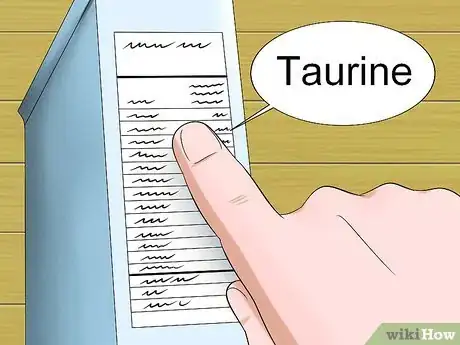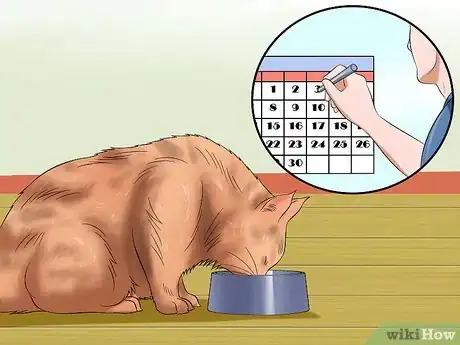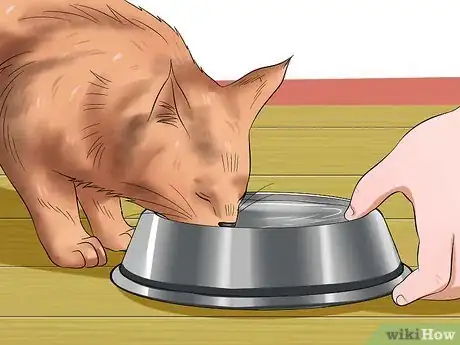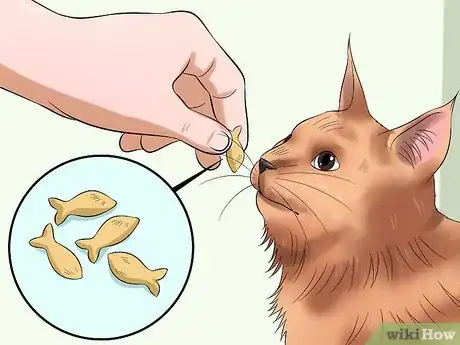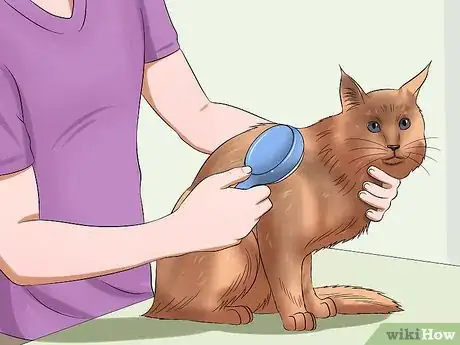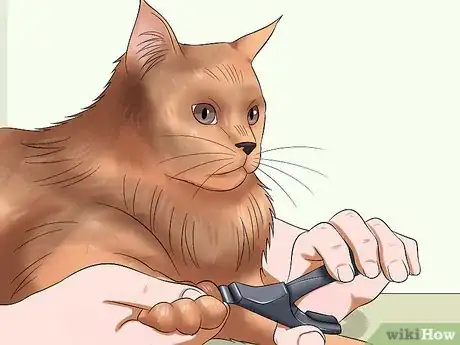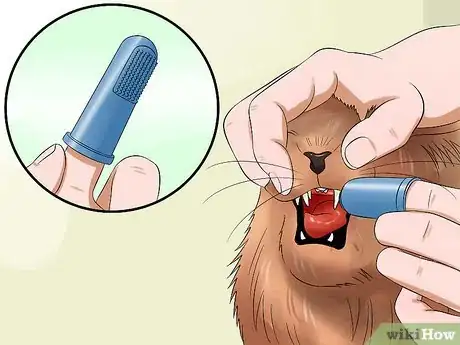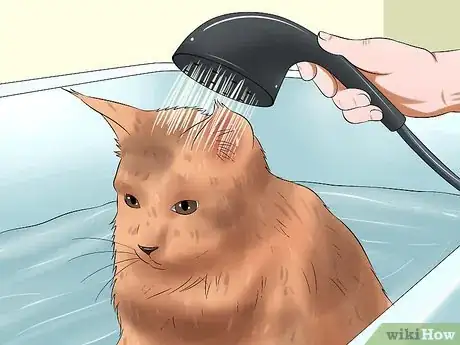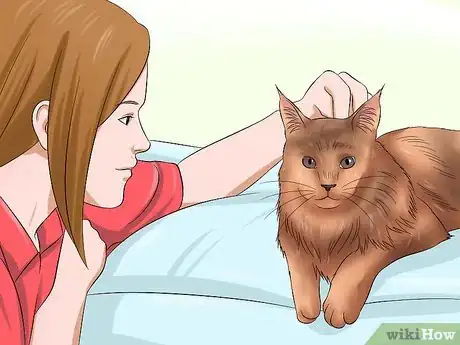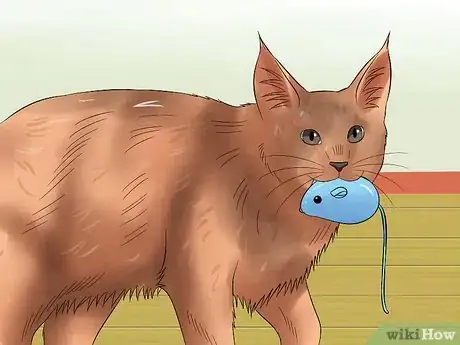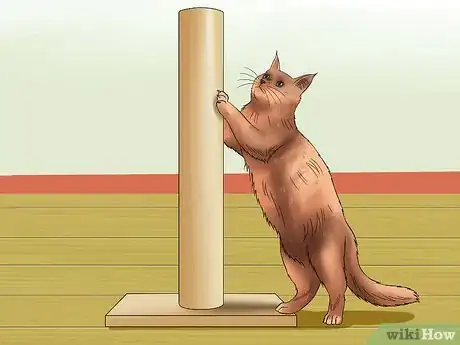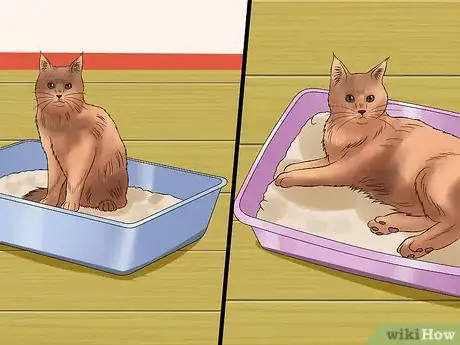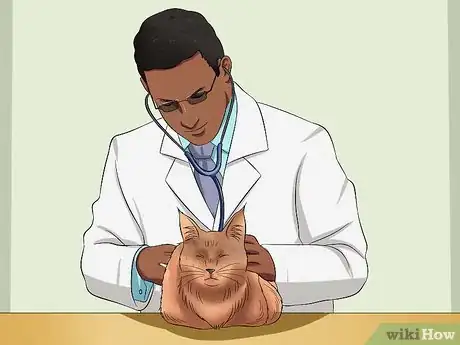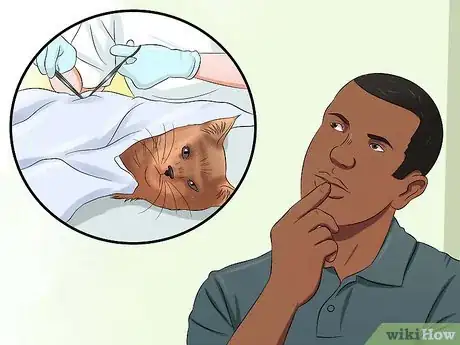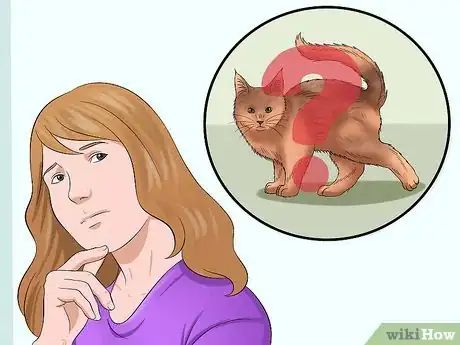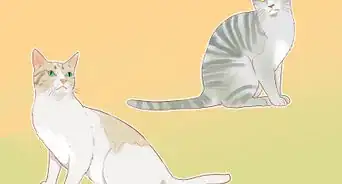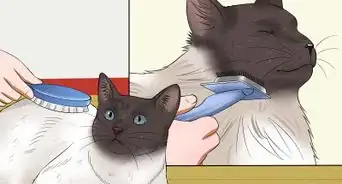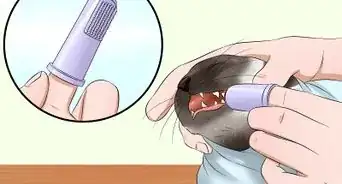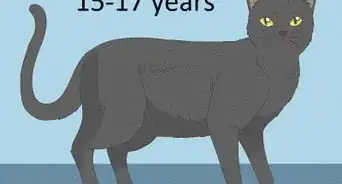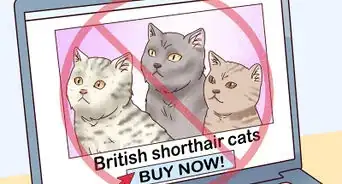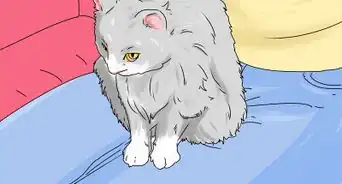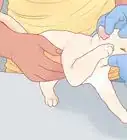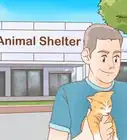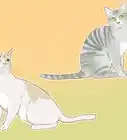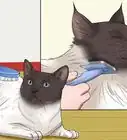This article was co-authored by Pippa Elliott, MRCVS. Dr. Elliott, BVMS, MRCVS is a veterinarian with over 30 years of experience in veterinary surgery and companion animal practice. She graduated from the University of Glasgow in 1987 with a degree in veterinary medicine and surgery. She has worked at the same animal clinic in her hometown for over 20 years.
There are 15 references cited in this article, which can be found at the bottom of the page.
wikiHow marks an article as reader-approved once it receives enough positive feedback. In this case, 96% of readers who voted found the article helpful, earning it our reader-approved status.
This article has been viewed 35,515 times.
Maine Coons are the official cat of the state of Maine.[1] These hearty, long-haired cats are known for their excellent mouse catching skills, their bushy tails, and their friendly demeanor. Maine Coons make excellent family pets, but they require good care to stay happy and healthy.[2] If you have a Maine Coon, then you will need to take care of your cat’s nutrition, grooming, entertainment, and health needs.
Steps
Feeding Your Maine Coon
-
1Choose a high-quality cat food. Maine Coons require a high-quality cat food to stay healthy. Choose a brand name cat food that is meant for cats. If your Maine Coon has any special dietary needs that your veterinarian has identified, then make sure that the food you select meets those needs. For example, if your Maine Coon is overweight, then your veterinarian may recommend feeding him food that is meant for overweight cats.
- If you are not sure if a food is considered high-quality, then ask your veterinarian.
- When choosing food for your cat, look for taurine in the ingredients list. Taurine is an essential amino acid that cats require. Not getting enough Taurine or other required nutrients may result in heart and eye problems.[3] [4]
-
2Develop a regular feeding schedule. Cat food packages list the amount of food that you should give your cat each day. You can use this amount to help you develop a regular feeding schedule. Divide the total amount of food that your Maine Coon is supposed to eat per day into two portions. Then, feed these portions to your cat about eight to twelve hours apart.[5]
- For example, you might give your cat her breakfast at about 7:00am and then give her dinner at around 6:00pm.
- Since cats prefer smaller meals, feeding your cat her daily food intake in two separate meals will make it more likely that she will eat all of her food.[6]
Advertisement -
3Provide plenty of fresh, clean water. Maine Coons need to have access to a source of fresh, clean water at all times. Make sure that you clean your cat’s water dish daily and keep it filled with clean fresh water at all times.[7]
- Do not place your cat’s food and water bowls near a litter box. Cats do not like to eat and drink near their litter boxes.
-
4Give your Maine Coon treats. Treats provide your Maine Coon with a little reward now and then, so it is nice to keep some cat treats on hand. Just make sure that you do not give your Maine Coon too many treats or he may become overweight or obese. [8]
- Try to limit treats to about 5% of your Maine Coon’s daily intake.
- Look for treats that can help to clean your cat's teeth as she chews. These treats can help to maintain your cat's dental health along with regular tooth brushing.
Grooming Your Maine Coon
-
1Brush your Maine Coon’s fur daily. Maine Coons have thick coats that require some care to maintain. Their coats are oilier than most cats’ coats, so they do not require as much grooming as other long haired breeds, but they still need occasional grooming.[9] Try to brush your Maine Coon once per week to keep his coat tangle-free.
- Most Maine Coons do well with brushing, but it is a good idea to start brushing early to ensure that your Maine Coon will tolerate it.
- To brush your Maine Coon, use a stainless steel comb and run it over your cat’s entire body. Give special attention to your cat’s tummy and tail because these can become matted more easily than other parts of your cat’s body.
-
2Trim your Maine Coon’s claws. Your Maine Coon can wear down his claws somewhat by scratching and moving around, but he may still need a trim now and then. To keep your Maine Coon’s claws from becoming too long, you will need to trim them about once every three weeks.[10]
- When you trim your Maine Coon’s claws, trim the white tips only. Do not trim the pink part of your cat’s claws further down the claw.
- Do not use scissors to trim your Maine Coon’s claws. Use a special guillotine style pet nail trimmer.
- If you would rather not trim your cat’s nails yourself, then you can also take your cat to the veterinarian or groomer for a trim.
-
3Clean your Maine Coon’s teeth. Cats are prone to dental problems just like humans, so regular brushing is essential. Brush your Maine Coon’s teeth once per day to keep her teeth healthy. Make sure that you use a special cat toothbrush and toothpaste on your Maine Coon.[11]
- Never use human toothpaste on your cat. Human toothpaste contains fluoride, which is toxic to cats.
-
4Give your Maine Coon a bath if necessary. Maine Coons are more tolerant of water than most other cat breeds. In fact, some Maine Coons even enjoy the water, so bathing your Maine Coon now and then should not be too difficult.
- Maine Coons do not need regular baths, but if your Maine Coon ever becomes dirty and requires a bath, then you should give her one.
Entertaining and Comforting Your Maine Coon
-
1Spend lots of time with your Maine Coon. Maine Coons love to be around people, so you will need to make sure that you can accommodate your Maine Coon’s social needs. Your Maine Coon may even try to follow you around the house and participate in your daily routine.[12]
- Try to set aside some time to just sit and pet your Maine Coon every day.
- Most Maine Coons are not fond of sitting on laps. Your Maine Coon may prefer to sit next to you while you pet her.[13]
-
2Give your Maine Coon some mouse-like toys. Maine Coons are well-known for their excellent mouse catching skills, so try to provide your Maine Coon with toys that will stimulate these skills.[14] [15] Try sticking to toys that stay low to the ground. Some good possible toy choices for your Maine Coon include:
- fur mice
- crinkly ball toys
- jingle ball toys
- electronic mouse toys
- a laser pointer aimed at the ground
-
3Put up some scratching posts. Cats need their claws and they also need to scratch. The problem is that sometimes cats will try to scratch things that they should not scratch. To prevent your Maine Coon from scratching things he shouldn’t, provide some scratching posts for your Maine Coon.[16]
- Corrugated cardboard and rope-wrapped wooden posts make great scratching posts. Try placing a few of these around your house.
- If you catch your Maine Coon scratching something he shouldn’t, do not yell at him or hit him. Just gently pick him up and take him over to one of his scratching posts.
- Try rubbing a catnip on your Maine Coon’s scratching posts. This may attract him to the posts and make him more likely to use them.
-
4Keep a couple of litter boxes for your Maine Coon. Your Maine Coon should always have access to clean litter boxes. Fill up the boxes with two inches of fine-grained, clay, clumping cat litter. Scoop out the litter boxes daily and change the litter at least once per week.[17]
- Always make sure that you have one more litter box than your total number of cats. For example, if you have three cats, then you need to have four litter boxes.
- Cats can learn how to use a litter box if you show them where the box is located. After you get your Maine Coon, take her to the litter box so she will know where to find it.
Protecting Your Maine Coon’s Health
-
1Take your Maine Coon for regular veterinary checkups. Maine Coons need vaccinations and regular checkups just like all other cats do. When you first get your Maine Coon, you will need to take her to see a veterinarian as soon as possible. During her first veterinary visit, your cat will have a physical exam and get tested for feline leukemia as well.
- To keep your Maine Coon in good health, you will need to schedule an annual appointment for your Maine Coon and also take her to the veterinarian if you ever notice a problem.
-
2Spay or neuter your Maine Coon. If you are not planning to breed your Maine Coon, then have your cat spayed or neutered to prevent unwanted kittens and protect your cat’s health. Spaying and neutering your pets helps to prevent pet homelessness and it also offers some health benefits for your Maine Coon, so your pet may live a longer, healthier life.[18]
- Spaying and neutering prevents hormonal behavioral issues and may also protect your cat from some health issues, such as uterine infections, enlarged prostate, and some forms of cancer.[19]
-
3Watch for breed-specific health problems. Maine Coons tend to be quite healthy, but they are more prone to a few conditions than some other cat breeds. Some of the conditions that you and your veterinarian will need to watch for include:[20]
- Spinal Muscular Atrophy. This condition is a type of paralysis that occurs mostly in Maine Coon kittens. If you notice that your Maine Coon is having trouble using his rear legs, then take him to see your veterinarian right away.
- Hypertrophic Cardiomyopathy. This is a thickening of the heart wall. Your veterinarian will need to perform regular heart exams to monitor the condition of your Maine Coon’s heart.
- Polycystic Kidney Disease. With this condition, cysts form in the kidney and destroy the organ. The condition can be detected with a DNA test or ultrasound.
- Hip Dysplasia. This is a type of arthritis in your cat’s hips. Watch your Maine Coon for signs that she is having trouble walking or jumping. If you notice that she is avoiding doing these things or showing signs of pain (yowling or hiding), then take her to see your veterinarian.
Warnings
- Do not change your cat’s food overnight. This can cause stomach upset. Change your cat’s food gradually if you must change it. Start by mixing a bit of the new food in with the old food and increase the amount of new food as your reduce the amount of old food over the course of a week.⧼thumbs_response⧽
- Never feed your Maine Coon human foods. Human foods add extra calories, which may cause your cat to become overweight. Some human foods are also toxic to cats. Never give your cat chocolate, alcohol, onions, garlic, avocado, caffeine, grapes, raisins, citrus, coconut, dairy products, nuts, raw meat, raw eggs, salt, bones, xylitol, or yeast.[21]⧼thumbs_response⧽
References
- ↑ https://www.maine.gov/sos/kids/about/symbols/cats
- ↑ http://cfa.org/Breeds/BreedsKthruR/MaineCoon.aspx
- ↑ https://www.aspca.org/pet-care/cat-care/general-cat-care
- ↑ http://www.ncbi.nlm.nih.gov/pubmed/8029223
- ↑ https://www.aspca.org/pet-care/cat-care/cat-nutrition-tips
- ↑ http://www.ncbi.nlm.nih.gov/pubmed/16772461
- ↑ http://www.humanesociety.org/animals/cats/tips/preventing_litter_box_problems.html
- ↑ https://www.aspca.org/pet-care/cat-care/general-cat-care
- ↑ http://cfa.org/Breeds/BreedsKthruR/MaineCoon.aspx
- ↑ http://www.humanesociety.org/animals/cats/tips/destructive_scratching.html
- ↑ https://www.aspca.org/pet-care/cat-care/cat-grooming-tips
- ↑ http://cfa.org/Breeds/BreedsKthruR/MaineCoon.aspx
- ↑ http://www.fanciers.com/breed-faqs/maine-coon-faq.html
- ↑ http://cfa.org/Breeds/BreedsKthruR/MaineCoon.aspx
- ↑ http://www.fanciers.com/breed-faqs/maine-coon-faq.html
- ↑ http://www.humanesociety.org/animals/cats/tips/destructive_scratching.html
- ↑ http://www.humanesociety.org/animals/cats/tips/preventing_litter_box_problems.html?referrer=https://www.google.com/
- ↑ https://www.aspca.org/pet-care/general-pet-care/spayneuter-your-pet
- ↑ https://www.avma.org/public/PetCare/Pages/spay-neuter.aspx
- ↑ http://www.maine-coon-cat-nation.com/maine-coon-cat-health-problems.html
- ↑ https://www.aspca.org/pet-care/animal-poison-control/people-foods-avoid-feeding-your-pets
About This Article
To care for a Maine Coon, feed it a high-quality cat food 2 times a day to get it on a regular feeding schedule. Also, make sure your Maine Coon has access to fresh drinking water at all times, and clean the water dish every day. You should also brush your Maine Coon's fur once a day to prevent tangles and mats. Even though Maine Coons have a lot of fur, you don't need to give your cat a bath unless it becomes particularly dirty. For more advice from our Veterinary co-author, like how to entertain your Maine Coon, scroll down!
